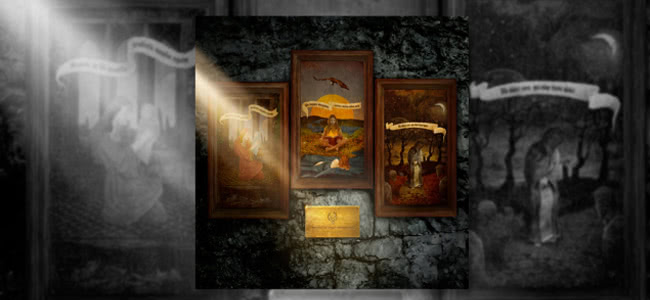Pioneers of progressive death metal, Opeth just aren’t that metal any more.
Moving further down the path they trod with their tenth studio album, Heritage, on the new record Pale Communion, they have made a cohesive beast of a prog-rock record.
In the lead up to the album’s release guitarist/vocalist, Mikael Åkerfeldt said that the album would be “slightly heavier” than Heritage but if you’re looking for a ‘Leper Affinity’, ‘Ghost of Perdition’ or ‘Deliverance’ on this record, you’re not going to find it. The heavy riffage and double-kick have all but disappeared in favour of lighter, cleaner adherence to the prog, blues and jazz sounds of the past.
The first seconds of ‘Eternal Rains Will Come’ sets the tone for the album with an explosion of soloing guitars and drumming in arrhythmia making clear the direction of the next hour of music. The pacing of this first track with verses and bridges coming in movements signal a band that has moved its goalposts further into 70s progressive rock territory moving between soulful vocal harmonies one second to jarring guitar solos the next.
There are elements of King Crimson, Porcupine Tree, Dream Theater and Rush dotted throughout and the band show their hand early with each of these influences heard if not all in the first track, definitely in the two that follow, ‘Cusp of Eternity’ and ‘Moon Above Sun Below’.
‘Moon Above Sun Below’ is the record’s centrepiece and, clocking in at over 10 minutes is a real journey of a song. It almost feels like Pink Floyd-esque in its epic structure, schizophrenic changes and ethereal atmosphere brought on by the quiet acoustic dynamic that Opeth do so well, and these delicate passages are often as gloomy and beautiful as the Scandinavian landscapes that spawned them.
Love Music?
Get your daily dose of metal, rock, indie, pop, and everything else in between.
Goblin is an instrumental Rush-esque prog-jam that really would have no place on an Opeth album only a few years ago. It’s almost like a polka for the first few minutes with it’s bouncing 80s layered organs until it veers back into more familiar prog-rock territory.
Album highlight, ‘Voice of Treason’ is more conventional with a consistent heartbeat of strings and drums and lamenting vocals feeding the verses before the prog-rock influences take over again with a bridge made of pure rock followed by piercing solos. Interestingly, this song was originally part of a score Åkerfeldt was writing for a film that was never made which explains the heavy use of strings on the track.
Åkerfeldt, has shown a penchant for layering vocals in harmony and chorus to great effect on previous efforts, mainly in unison with heavier elements to balance things out. Unfortunately, without the intense guitars in the background and without the urgency of the growls, the clean vocals lose something in the mix. If the vocals are going to be a central part of your sound, they are going to need more than power. Emotion is going to have to come into play at some point and, in clean mode, Åkerfeldt just doesn’t seem to have it in him.
However, on a purely musical level, Pale Communion feels more focused than Opeth’s last effort. It is dense with musicality that will often only reveal itself on repeated listens. While Heritage often felt strained and wayward at times, Pale Communion knows what wants to be and so it is, a fully formed progressive rock record.
Fans of Opeth will be split with this album like they were on Heritage. With past releases they have used the progressive rock influence in connection with their death metal roots but with their last two albums they have severed the bond almost completely and those yearning for the meaty guitars of old may even mourn the death of a metal band. However, the band have become something much more exciting and vital than just another metal band.
The Opeth you once knew is dead. Long live Opeth.
Pale Communion is out Friday the 22nd via Warner

































